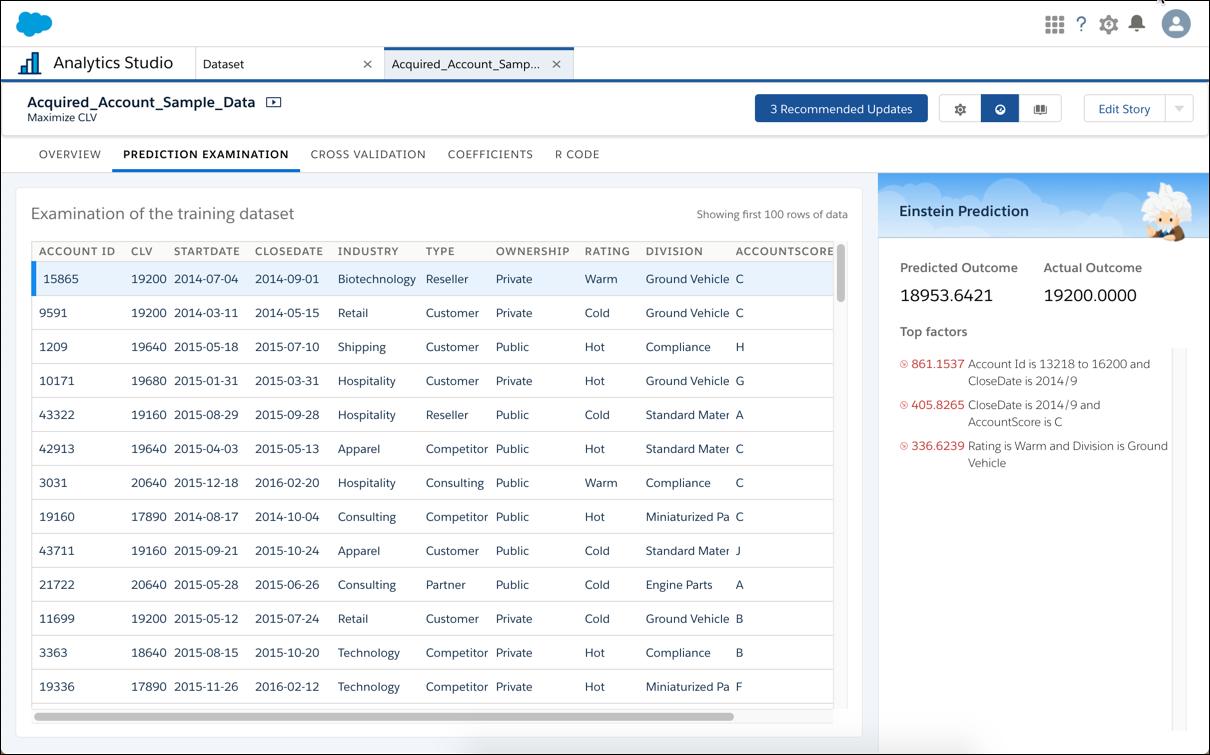
5 minute read
Salesforce Einstein
Einstein is everywhere this summer!
This year, Salesforce Einstein is similar to feeding beetroot to a baby, it is all over the place! And we are smiling because of it. With years of experience in Data, Business Intelligence and Analytics, it is refreshing to see Salesforce approaching the topic not as a separate island of IT and Data departments, but embedding it across all Salesforce products, as close as possible to the business process and users. Let’s look into four themes which caught our attention!
Advertisement
Enabling Trust
Perhaps one of the key reasons why companies are struggling to adopt Data and Analytics, is a matter of Trust. On one side we see business users asking questions like “Are you sure the data is correct?”, “Did it take reason X into account?” and “How accurate is the prediction?”. On the other side we see increased attention in society to address diversity, inclusion and ethics in our Data and in AI. To help out, Salesforce is releasing two key features this summer: Bias Protection and Enhanced model metrics.
When your Data Scientist is building models in Discovery, Einstein will provide a notification when important data for the model may be biased and will allow the user to easily exclude (“protect”) it from your model.
Protect (exclude) variables and examine the prediction dataset

”Trust is key in any data product, whether it is a report or an algorithm. No matter how valuable your data product may be, Trust will determine the adoption and usage of your data product. And without usage, no success.”
Luuk Martens, Practice Manager Analytics & AI
”With these new Einstein Discovery features, Artificial Intelligence becomes more and more accessible for the mass. The unique combination of low code AI, rapid prototyping and the simplicity of applying it to core business processes can help your business become more data driven in an eye wink!”
Jip Koning, Analytics & AI Consultant
Embedding Analytics
Bringing the data and insights to the fingertips of your users is key to becoming a data-driven organisation. Salesforce already provided several “unofficial” components which required some minor coding and integration to get Einstein insights to your page-layouts. As of the Summer ‘19 release, Salesforce is rolling out several official standard integrations of which we want to highlight 3:
Display Einstein Discovery Predictions in Lightning Experience Record Pages Get Code-Free Predictions on Salesforce Records (Pilot) Put Einstein Next Best Action Recommendations at Your Agents’ Fingertips
It is now possible to add Einstein Predictions with drag-and-drop functionality to a standard Lightning page and although in Pilot, the writeback procedure for Einstein Prediction scores and models don’t require a managed package anymore. The final and perhaps most interesting feature in this set is the integration of a standard integration for the Next Best Action flow-builder. First of all NBA was improved with enhance and generate bulk recommendations, and secondly a standard action to include your Einstein model will now allow you make your recommended actions even smarter!

Perhaps one of the main concerns when thinking of implementing Artificial Intelligence and Big Data is the question of “Do we have enough data?”. We are seeing the following signs Salesforce is addressing this exact question and expect them to take it even further in the next release.
Gain Insights from Smaller Einstein Analytics Datasets Sales Cloud Einstein: Get Ready for Global Models
The first sign is great for organisations who recently implemented one of the Salesforce clouds. There is no need to wait until you have years of data in your system, the basic discovery stories already start displaying insights based on a dataset of only 50 examples (rows), while the more advanced predictions now will only require a minimum of 400 examples.
The second sign is a bit more fundamental to the Sales platform. And although it is not a feature we currently see active anywhere, it hints on what’s to come. Rather than training your model only on your data, Salesforce is seemingly looking at global use cases which could be trained on data coming from multiple orgs and perhaps many different companies working together. This way you would be able to leverage pre-trained algorithms based on anonymized global Salesforce data (imagine how much data could be in there!). We are expecting to see more communications about these Global Models moving closer to Dreamforce 2019.
Display insights with Discovery Stories

”Driven by impressive newsworthy examples of Artificial Intelligence, many organisations think Data, Analytics and AI is something for PHD Data scientists or far in the future on their roadmap, but with Salesforce, every organisation is ready to start.”

Einstein for Freemium
As stated before, Einstein is everywhere this summer! Besides use-cases in the Sales & Service cloud we also start seeing more of him in Pardot and Platform. The release notes are full of various minor and medior improvements to these applied AI cases (improved Bot-to-Agent handover, improved forecasting and Campaign Insights), but what grabbed our attention was actually something not mentioned in the Release notes!
Looking at the latest Einstein Cheat-sheet, we are seeing several of those cases being introduced as a freemium within your current license, making the threshold to apply the basics of AI even lower! Examples are the Einstein Activity Capture in Sales Cloud and the Einstein Next Best Action in Service Cloud. This will allow you to quickly test and see how the power of those applied AI use cases can benefit your organisation.
”The freemium model is a great way to experience full Einstein capabilities in your own production org without an extra license. For example, empower your Service & Sales productivity and customer satisfaction with Einstein Next Best Action, which is free up to 5K requests!”




